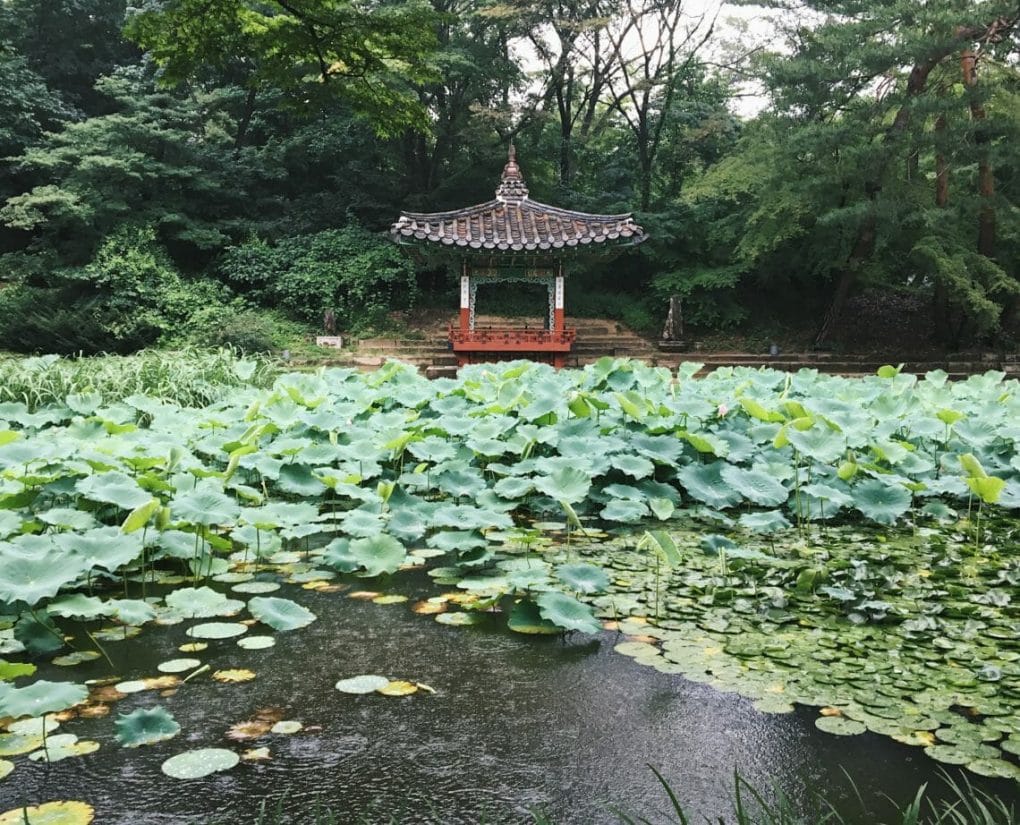Have you ever wondered what it takes to teach English in Korea? As one of the highest rated places to teach abroad, there’s a reason expats recommend South Korea. This guide shares all you need to know to get started!
Teaching English in Korea is a great way to live and travel Asia while making an income to do so. And thankfully, there’s actually a surprising number of different ways to teach English in South Korea. I personally went through EPIK, Korea’s public school system, and loved it so much that I stayed for two years.
If you’re here searching for all the different ways to teach English in South Korea, I’m so happy to help. This ultimate guide shares how to teach English in South Korea, and the different teaching jobs in Korea available.
This post may contain affiliate links, meaning at no additional cost to you, if you click my links and make a purchase, I may earn a small commission. Learn more on my disclosure page. Thank you for your support!
Why Teach English in Korea?
Korea is ranked as one of the best places to teach English abroad for good reason! Here’s why you should consider teaching in Korea:
The high salary and benefits: South Korea has some of the highest paid teaching jobs and offers fantastic benefits without official teaching experience. Many teachers receive flight reimbursement to and from the country, subsidized apartment/rent, national health insurance, contract completion/renewal bones etc.
Affordable cost of living: Compared to the US, the cost of living in Korea is very reasonable, which means that even on a teacher’s salary, you can enjoy an active and more luxurious lifestyle. Medical care and beauty treatments are also super affordable here!
High demand/many job opportunities: Finding a teaching jobs in Korea isn’t too difficult as long as you meet the job requirements!
Fun in-country travel: There are a lot of beautiful paces to see in Korea and exciting Korean hiking trails! The comprehensive public transportation system makes it super easy to get around the country.
Vibrant culture and expat scene: It’s just fun living in Korea when you meet the right people! Whcih is very easy to do because of how many expats live in Korea! The food, nightlife, Kpop, Korean shopping, festivals, etc. all made my time in Korea enjoyable.
Everything You Need to Know to Teach English in Korea
First things first, we need to cover the standard requirements for teaching English in Korea. While it varies from program to program, these are the set requirements you need.
Job Requirements for Teaching English in South Korea
1. Be Native English Speaker
Schools in Korea are pretty strict about this one, and will usually only hire native-English teachers from; The U.S., Canada, The UK, Ireland, Australia, New Zealand, and South Africa. Indian citizens are also eligible to teach English in Korea with proof of high English ability and a teaching license.
Some private academies may hire teachers who have a high TOEFL score if you’re a non-native English speaker. But you will not be eligible for the standard E2 teaching visa. Sadly Korea is somewhat close-minded and often does discriminate when it comes to hiring English teachers – it’s not easy to find a job if you’re not a citizen from the above countries.
2. Have a College Degree
Most hiring positions also required teachers to have a college degree, either a Bachelor’s or a Master’s. It doesn’t matter what the degree is in, but International Schools or Universities may require ENglish teachers to have an actual degree in Education/a teaching license.
3. Have a TEFL Certification
If your degree isn’t in education or English, then you must also have a TEFL certification under your belt. Most schools, including the EPIK program, accept online TEFL courses.
When choosing a TEFL certificate for Korea, it’s always best to choose a course with at least 120-hours or more. A course that includes in-person or classroom hours is also a major plus, and is a requirement for school placements in Busan. Look for at least 20 hours of in-class instruction if you choose an online course.

Choosing a TEFL Certification for South Korea
Choosing a TEFL course was one of the most stressful parts of the job search in Korea for me! I’d heard that English teaching jobs in Korea can be competitive and that your TEFL course you take can make all the difference. I ultimately decided to go with CIEE’s Teach Abroad/TEFL program and was successfully admitted to the EPIK program.
If you’re looking for something cheaper, an affordable TEFL is also totally acceptable – I had many friends accepted to EPIK with a $200 TEFL. But if you’re looking for some guidance, here are some TEFL recommendations I know aspiring teachers have had success with:
- iTTT TEFL: An affordable TEFL provider with many options, accreditation, and a relaxed learning schedule.
- Premier TEFL: Another affordable TEFL company based in Ireland run by TEFL teachers who’ve been in the biz for 25 years.
- The International TEFL Academy: Often named #1 TEFL provider, tons of resources, in-depth material, many school/job partners for graduates.
I have a 20% off discount link at iTTT for reader’s interested! The discount is applied directly at checkout.
How to Get a Visa to Teach English in South Korea: E2 Visa
To legally teach in Korea, you’ll need to apply for an E2 visa at your local Korean embassy before leaving home. To get an E2 visa, you’ll need to prove that you have a degree, are from the approved list of countries, can pass a health and drug screen, and have a clean criminal background check.
You’ll need to submit certified copies and documents that prove the above requirements (Apostille copy of degree, official and sealed transcripts, FBI/nationally approved background check, etc), proof of employment or contract in Korea, your original passport, passport photos, application form, and the fee, which varies depending on where you’re from (I paid about $45 as an American).
These items can be submitted by mail, including your passport, and then processed within 1-2 weeks. You will get your passport back with a full page visa imprinted that states you’re legally allowed to work in Korea.
To learn more, visit your local Korean embassy or the Korean immigration website.
7 Best Teaching Jobs in South Korea
There are actually quite a few different ways to teach English in South Korea. The two main routes are through the English Program in Korea (EPIK), which is the public school system, or at private after school English academies known as hagwons. But your options are not just limited to these two common opportunities! Let’s check out all the ways to teach English in South Korea.
1. The EPIK Program: Korean Public Schools
The EPIK program is a program that hires teachers to teach at public elementary, middle, and high schools around the country. Your position as a NET (native English teacher) means teaching alongside a Korean co-teacher. After my experience in Korea, I think of EPIK as one of the best teaching jobs in Korea.
This position is through the Korean government, and there are two application periods that open in the fall and spring. The school year starts in the spring (February), so if you come in fall you’ll be starting halfway through the year.
↠ Read More: A CIEE Teach Abroad in Korea Review + How to Save $200
Pros of teaching with EPIK:
- It’s a one year contract that can be renewed if it’s a good fit for you and the school.
- The EPIK salary and benefits are the best and include many bonuses, free housing, flight reimbursement, a pension, job orientation and moving support.
- Hours are a normal workday: Monday – Friday, 8:30am – 4:30pm. 22 teaching hours / week, rest of 40 hour week for lesson planning.
- Vacation time is 26 days + national holidays off. Vacation days can only be taken during the summer and winter holidays.
- Free job orientation and a ton of support when moving to Korea and getting settled. EPIK picked me up from the airport, literally drove me to my apartment after orientation, and helped me get my life set up. So easy.
Cons of teaching with EPIK:
- The application process is intensive and can be expensive because of all the documents needed to apply to EPIK.
- EPIK teachers don’t get the full summer or winter breaks off. You must come in to ‘desk warm’ (sit and literally do nothing) or teach English camps outside of your allotted 26 vacation days.
- EPIK teachers don’t get to choose their placement. You are at the mercy of where the government places you. You do get to list one city as a preference, but no guarantee you’ll get it.
- A placement in Seoul is VERY competitive and VERY unlikely. Unless you have proper teaching experience and education – and even then you probably won’t get it.
For a deeper dive into how to apply to EPIK, check out my massive guide.

2. Hagwons: Korean Private Academies
In Korea, the culture of private academies is widespread. Most students, or those who can afford it, spend many nights after school studying all different subjects, to give themselves a competitive edge. They start going to these academies as young as kindergarten!
This is probably one of the easiest ways to teach English in South Korea. If you want a job and fit the requirements, your chances of getting a job at a hagwon are very good.
Some quick facts about academies/hagwons:
- There is no application period. Hagwons hire all year round depending on their needs and open positions. You can arrive in Korea whenever and have more freedom with where you live and work.
- It’s typically a one year contract.
- The pay and benefits aren’t always as good as EPIK. Rarely it can be better. But since it’s a private institution, they have the freedom to pay and offer benefits as they see fit.
- Vacation time is usually only 10 days and typically no national holidays off. Finding time your hagwon will let you take vacation days can be difficult and they may not let you take many consecutive days off. If you need more time off, you most likely have to pay out of pocket for your sub teacher.
- Hours are usually weeknights and sometimes weekends. Because hagwons are private academies for students to come practice their English, it’s often during after school hours. You can work anywhere from 2pm – 10pm any day of the week, and you may not have a standard two day weekend like everyone else.
- The application process is a lot easier than EPIK.
- Hagwon teachers don’t get the summer or winter breaks off. These private academies run the entire year, so you will have classes the entire year.
- Hagwons can have a bad reputation. Since these are private institutions, there is no government regulation for the way they conduct business and treat their employees. Be sure to do your research and make sure they are a reputable academy that follows the law. You can search http://blacklist.tokyojon.com/ to check to see if your specific hagwon has had any anonymous bad reviews. It’s a famous website for teachers to share their horror stories to warn others.
- Elementary through high school aged students.
One of the biggest questions people need to consider- is public or private school? I’ve gone through and shared my pros and cons for teaching through the EPIK program to hopefully give you a little more insight into making the right decision for you!
3. Private School + International School Jobs in Korea
A more prestigious teaching job can be found at one of the many private schools or international schools in the country. The pay at these places are great and you are a teacher with complete responsibility for your class and students.
Some quick facts about private schools:
- Need an actual teaching degree and teaching experience. These positions are few and far between and aren’t for those – like me – who are just TEFL certified. You need to be a fully-fledged teacher to get a job at a private school.
- Not as many jobs as through hagwons or EPIK.
- Much more competitive.
- Can be difficult to find these jobs. Unless you know someone or are familiar with the school, it can be hard to find these job postings as there isn’t a single place where ads are placed.
- Pays well.
- Typically a much longer term gig than just one year.
- Elementary through high school aged students.
I’ve actually only met one person who found a job at a private school, and they first started their journey in Korea as a hagwon teacher. I think once you live in the country, make connections and find your bearings, it’s much easier to find these jobs. Especially because there isn’t really a ‘job board’ where all openings are posted. It’s more of who you know, what school names you’ve heard of, or right time right place. But it is possible!

4. English Teaching Assistant at a Korean University
Another one of those jobs that’s right place, right time, right people – is an English teaching assistant at a local university. It’s not an uncommon way to teach English in South Korea for native English speakers. And I even know people who got these jobs without a degree in English or teaching! So while I wouldn’t say that anyone can get these jobs, they are available for those looking for something more long term and serious in Korea.
Some quick facts about university positions:
- Usually need a degree in the correct field and have some experience – although not mandatory.
- Not as many jobs as through hagwons or EPIK.
- Much more competitive.
- Can be difficult to find these jobs. Unless you know someone or are familiar with the school, it can be hard to find these job postings as there isn’t a single place where ads are placed.
- Pays well.
- Typically a much longer-term gig than just one year.
- Teaching college students.

5. Teach at an English Village in Korea
Throughout Korea, there are full English immersion programs / education institutions called English Villages. Each one is different, but the main idea is that students come to the English Village usually to stay for an entire week while learning, playing and studying English.
My students at the public elementary school I work at actually visit the English Village near Daegu for a week each year. They play games, learn songs, practice role plays and it sounds a lot like what Americans do in summer camp. So because these places teach English, naturally they look to native English speakers to teach!
Some quick facts about English Villages:
- There is no application period. From what I’ve heard from people who work at these villages, it seems they hire on an as-needed basis. It’s best to contact the village directly to see what their employment needs are.
- It’s typically a one year contract. Often allowing for extensions of shorter chunks of time, which is SO convenient for those who want to stay longer than a year, but don’t want to commit to two.
- Decent pay on par with EPIK and hagwons. I think these villages may fall in between the perks of EPIK and hagwons, but they are run as private institutions so it all varies and depends on your village.
- Vacation time is usually 15 – 20 vacation days.
- Typical normal working hours with possibility of evening, weekend and holiday hours.
- English Village teachers typically work summer and winter breaks as well.
- The same program is usually run every week. These English Villages often act as a place students take a field trip to learn English, so that means you’ll most likely be responsible for the same lesson, over and over again to a new batch of students every week. It’s good to know in advance, as I’m sure it can get tedious.
- Elementary through high school-aged students.
From what I’ve read online, it seems there are maybe 30+ of these English villages around Korea. The three that I think are most well known or that I just happen to know of are in Daegu, Seoul, and Paju (way north by North Korea).
English Village Jobs in Korea
Daegu Gyeongbuk English Village – The Daegu English Village is actually run by a partnership of the Auburn University and Daegu’s Yeungjin University.
Paju Gyeonggi English Village – Th Paju English Village is located near the North Korean border, a little more than an hour north of Seoul. It’s publicly owned, and I actually know of a few teachers up there who teach drama and theater in English – sounds pretty fun!
Seoul English Village in Suyu – Run and operated by YBM, one of the leading English textbook creators in South Korea, this English camp is pretty well known and may be competitive for its location near Seoul.

6. Gyeongnam Office of Education (GOE)
The Gyeongsang province of Korea is located in the south near Busan. The GOE is actually part of the public school system and is a very similar program to that of the EPIK program listed above. The main difference is that the GOE handles the application process directly and placements are rural and in the specific area of Gyeongnam province.
Some quick facts about the GOE:
- No application period. Unlike EPIK, the GOE accepts applications year-round offering a bit more flexibility than the rigid two intake periods of EPIK.
- Rural placement likely and little to no choice. The two biggest cities in this province are Changwon and Gimhae, which really aren’t that big. The plus – this province is close to the wonderful city of Busan, Korea’s second-largest city.
- It’s a one year contract.
- The pay and benefits are pretty good. They are on par with the EPIK program, although I do believe their monthly starting salary is about 100,000 won more than EPIK (about $100 USD) to make up for the rural placements I’m sure.
- Hours are Monday – Friday, 8:30am – 4:30pm. 22 teaching hours/week, rest of 40 hour week for lesson planning.
- The application requires a LOT of documents. I can’t verify for sure, but since this is a government run program, I’m 99% certain the application requires the same documents as EPIK .
- Vacation time is 26 days + national holidays off. Vacation days can only be taken during the summer and winter holidays.
- GOE teachers don’t get the full summer and winter break off. You’ll most likely teach English camps during the school holidays or be required to come in regardless
- Elementary is most common followed by middle school and high school positions
For more information, you can check out Korvia’s GOE guide, which is one of Korea’s best and most reputable recruiters for English teaching positions in Korea.

Bonus: Teach English Online to Korean Students
If you’re interested in teaching in Korea but want somewhere to start, consider teaching English to Korean students online. I’ve put together a guide sharing the best online teaching jobs in Korea that highlight some of the best platforms. The teaching requirements are generally the same as actually teaching in Korea, but few jobs don’t require a degree or a TEFL.
The Best Places to Teach in South Korea
Now that we’ve covered your teaching job options in Korea, deciding where to move is next! Most expats dream of living in Seoul, but it’s not always an option. Job competition in Seoul is super high and the requirements can sometimes be tougher. Here’s a quick list of the best places to live in Korea for teachers.
- Seoul is obviously a top choice. This big city has a population of 10 mil people. It’s home to fun nightlife, excellent eateries, a more liberal and open-minded atmosphere, and is where the bulk of expats live in Korea. Seoul is located in the north, which means longer distances traveling around the country. But the Korea’s main airport is nearby making international travel easy.
- Busan is Korea’s second largest city that’s nestled on the southern coast. Busan is known for it’s relaxed atmosphere, excellent seafood, arts and film festivals, and colorful village. Jobs in Busan may require more in-class hours on TEFL certs, so be aware when applying.
- Daegu is the country’s third largest city and is centrally located. I taught in Daegu and ended up loving it beacuse it has a big expat scene, a fun downtown area, and great access to other places around Korea. Daegu is known as Korea’s hottest and most conservative city.
- Jeju Island has the nickname the “Hawaii of Korea” and is an island off the south coast. It’s a small destination and more rural feeling, but there are beaches, pretty hikes, and even surfing.
- Incheon/Seoul Outskirts are another top choice for aspiring teachers. If you dream of Seoul but can’t nab a job there, the surrounding areas are a good second choice. Pay is good and the easy access to Seoul is a major pro.
Honorable mentions include smaller cities in Korea like Gyeongju, Daejeon, Gwangju, and Suwon. They’re much smaller and offer a more rural glimpse into life in Korea for those not so keen on city life.
There you have it – a comprehensive guide sharing how to teach English in Korea! Questions or comments? Share below!





Can you get a job teaching English if you don’t have a teaching degree (a different field but a higher level degree) or certificate? And do you need to be able to speak Korean, or just be proficient at English? And what might an average class day look like? Thank you! This sounds absolutely perfect, and almost too good to be true.
Hi! It’s true and really a great opportunity haha! But Yes you can get a job teaching English with a non-education related degree in Korea’s EPIK program or at a hagwon (private language academy). No Korean needed but must have degree, TEFL certificate and clean background. Your class day depends on the type of job! But usually is just about 4-5 classes per day with a Korean co-teacher, teaching English and playing educational games. I have many guides on my blog that I recommend checking out 🙂
Hello! This was very informative! It seems that the teaching experience in South Korea is really fun, and I am very interested, but I am not a native speaker from the countries listed. May I know what are the chances of getting hired/finding a teaching job in South Korea if you’re a non-native English speaker? By any chance, have you met a non-native English speaker who works as an English teacher in any of the teaching jobs you mentioned? What kind of visa is needed for that case? Are there other requirements?
Thank you very much!
Hi Shamia! Thank you for reading! Unfortunately it’s not that schools won’t hire teachers from different countries, it’s that the work visa specifically to teach in Korea is only granted to people who have citizenship in those countries :/ I’ve never met someone who taught and wasn’t from one of those countries. Korea does have a working holiday visa granted to young adults under 30 or 35 that you could see if you qualify for! It’s offered to a wider group of people and is another way to live and work in SK, although I’m not sure if you’re allowed to teach on it. I recommend checking the website of the Korean embassy for your country to see what your options are as every country has different visa rules and offers. It depends on where you’re from 🙂 I hope this helps!!
Hello! Thank you for the thorough explanation. I am not a native English speaker but will soon be doing a Masters degree in English. Is there any chance I can land a teaching job without TEFL? What locations or type of school(Hagwon or Public schools) would be ideal for Non-NES like me?
Hi there! Thank you for your comment! Non-native speakers can teach in Korea so long as they can prove native ability and have citizenship from the approved list of countries for the Korean E2 visa (the teaching visa) which is as far as I know unfortunately is only the U.S., U.K, Canada, New Zealand, Australia, Ireland, South Africa and India. But you should check your Korean embassy’s official website for up to date information. If you have a passport from these countries, it’s my understanding that almost all jobs require teachers to have a TEFL certificate but you may be able to find work at a hagwon without one. Without a teaching license or degree in education public schools are less likely an option, but you can always inquire before applying. I hope this helps!!
Hello! I’m not a native English speaker (I’m Indian) so after completing BA English is it possible for Indian to become English teacher at SK
I think India is in approved list so
If it’s possible then how/where can I apply for job & what are the requirements
Hello Devika! It’s my understanding that for Indian citizens to teach English in Korea, you must have a valid teaching license on top of the other general requirements like a clean background check, proof of English ability etc. I recommend contacting the nearest Korean embassy in your home country to request more information, as it all relates to your visa eligibility. I also found this little snippet of helpful info on Quora: https://www.quora.com/As-an-Indian-girl-how-can-I-become-an-English-teacher-in-South-Korea
Hope this helps!